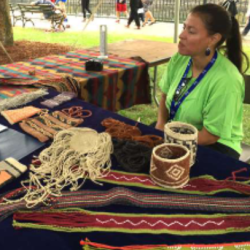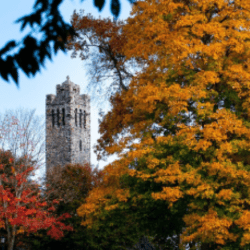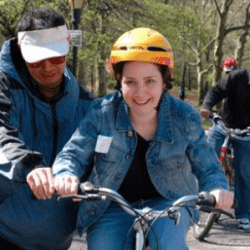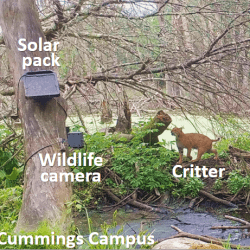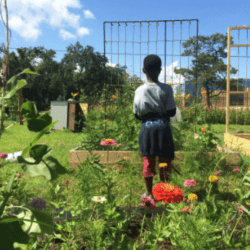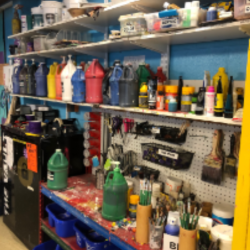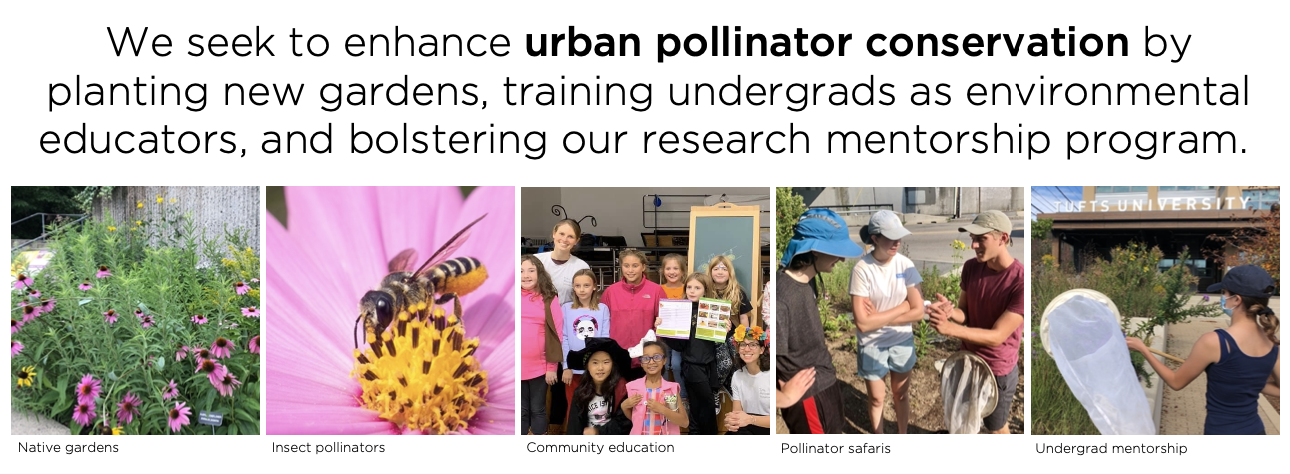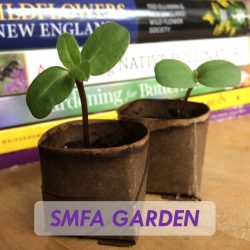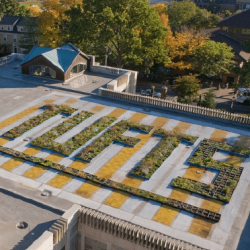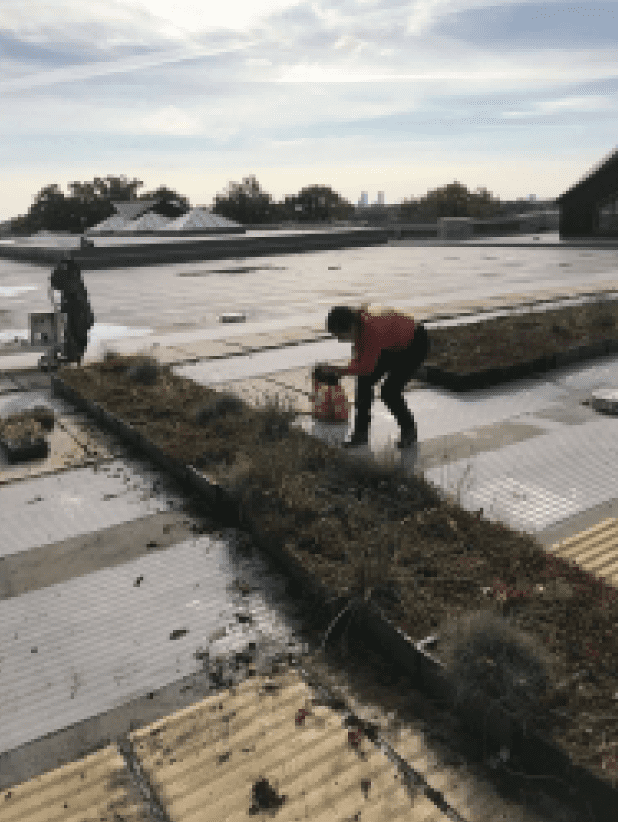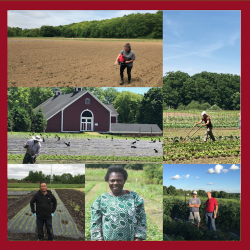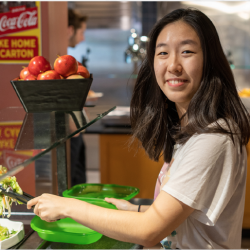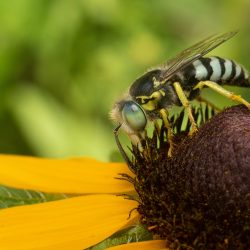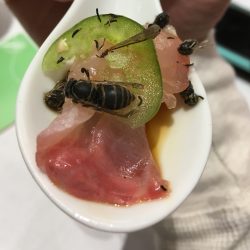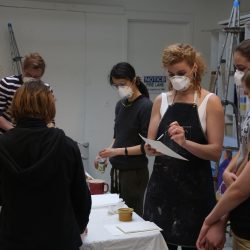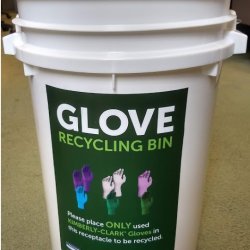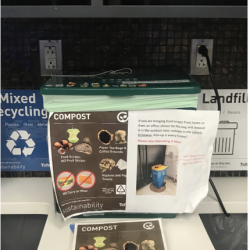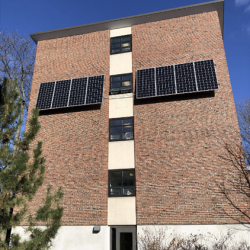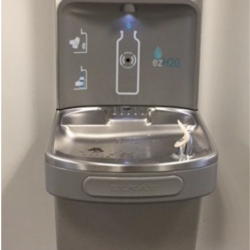Completed Green Fund Projects
Green Fund projects can take many forms, from university-wide events to the installation of greener technologies. Learn about past completed Green Fund projects below.
Academic Year 2022-2023
The Double Arrows project worked with artist Elizabeth James Perry, a member of the Wampanoag Tribe of Gay Head - Aquinnah, to do a restorative planting garden with an emphasis on natural dye plants at the Indigenous Center in conjunction with her solo exhibition at Tufts University Art Galleries. It will extend the Galleries' project into a long-term engagement with the Tufts community through building outdoor container gardens and planters with Native plants conducive to natural dye, weaving and basketry practices. Double Arrows' gardens will continue to be stewarded by the Indigenous Center students through a manageable caretaking plan for the next three years. The group will create one or two container gardens at the Indigenous Center. Perry will do a workshop with students in advance of planting to share natural dye planting and weaving techniques and interested students can join her in the transplanting seedlings to the plot in May 2023. The Green Fund selection committee awarded Double Arrows $5,750 for container planters, facilities needs, seeds, plants, soil, gardening supplies, workshop supplies, an artist honorarium, and student stipends for project management and caretaking.
This project aimed to get the Medford/Somerville campus certified as a Tree Campus Higher Education by the National Arbor Day Foundation. This created opportunities for Tufts community members to get involved with urban forestry and build a support system for maintaining and expanding our canopy while drawing attention to the need for intentional tree protection. Long-term, the team created opportunities for students to volunteer and intern with the cities of Medford and Somerville. The Green Fund selection committee awarded the team $8,050 to fund trees, Arbor Tree event costs, tree inventory supplies and analysis, t-shirts, and identification signs.
The 16th annual Tufts Nutrition Data Symposium (theme: Sustainability NOW! Action-Oriented Solutions for Food Systems, Nutrition, and Diet) is a student-driven event that aims to empower the next generation of professionals in nutrition, public health, and data science. Held from March 8-10th, 2023, TNDS will feature hands-on workshops, student research, networking, exploration of solutions, and learning from experts. It will promote sustainability across multiple domains while highlighting solutions and action in the nutrition sustainability space; expose important topics, provide hands-on analytical and technical workshops, and opportunities to practice communicating findings; and advance student careers by connecting students with new ideas and other researchers. The Green Fund selection committee awarded the TNDS Leadership Committee $3,600 to support operational and technical costs, awards, giveaways, and honoraria for external keynote speakers.
The Green Exercise Initiative will install an energy producing treadmill in the Steve Tisch Sports and Fitness Center to work towards a carbon-neutral Tufts and promote a healthier herd. The treadmill will produce clean energy while increasing awareness of CO2 production. Energy produced will result in a profit of $138/year. After the pilot project is completed, success will be reviewed, and Tufts Athletics may explore the possibility of replacing all gym equipment with energy-producing equivalents. The Green Fund selection committee awarded the team $5,382 to fund an energy-producing treadmill, freight, and installation.
This project will teach the Tufts community bike riding so that they can navigate in a safe, sustainable and more efficient way on campus. There are numerous bike services on campus: bike check-outs from Tisch, a free bike repair shop, and numerous bike racks all over campus. However, all these programs can only serve a limited population: those that already know how to ride bikes. The project aims to bridge the gap between those who have had the opportunity to learn biking at a young age and those who have not. The Green Fund selection committee awarded Bos to Bikers $4,110 for safety equipment, helmets, trainings on teaching biking, and compensation for biking teachers.
This project will support conversion of most of Tufts Center for Conservation Medicine’s Grafton Campus wildlife camera array, known as Cummings Critter Cams, from battery to solar power. The Cummings Critter Cam project helps train MS students, but is also used for ongoing research projects, local outreach, and to give the Tufts community a greater appreciation for the wildlife around the Grafton campus. Solar conversion will minimize use of disposable and rechargeable batteries and allow for fewer camera checks, thereby lowering human disturbance. By powering cameras indefinitely, it will save time, money, and the impact of human traffic in the forest for checking the cameras. The Green Fund selection committee awarded the team of students and professors $2,600 to cover costs of solar packs, security cable locks, and retrofitting.
This team will organize a recurring symposium for the development and exchange of ideas in the Environmental Humanities, leading to future collaborations and place-based projects on our university’s campuses. Tufts faculty, students, and staff across schools, as well as local activists and Indigenous residents, will be invited to participate in the symposium and lead discussions to unpack pressing topics and take active part in defining questions, conversations, and hands-on projects. The symposium will include a panel and roundtable that reimagines a particular challenge on the Tufts campus by using Environmental Humanities frameworks. A session will focus on the widespread use of monoculture lawns on the Medford Campus, and the event will conclude with a proposal for the Medford campus. Graduate and undergraduate students will contribute to planning, promotion, event moderation, and participation. The team will partner with student clubs and academic courses to foster knowledge creation and community building around the Environmental Humanities both in and outside the classroom. The Green Fund selection committee awarded the team $5,700 to cover speaker honoraria and transportation, marketing, printing, and food for attendees.
The Tufts Craft Center is a student-volunteer-run space on the Medford Campus. By investing in a Craft Center Box, it would give student groups access to a set of shared craft supplies for use at campus events, especially at times of high demand for the center’s supplies. This box will be available for student organizations and identity centers to borrow the box for workshops. The Green Fund selection committee awarded the team $693 to fund storage bins, scissors, markers, glue sticks, rulers, and replacement materials.
Academic Year 2021-2022
The 2021-2022 academic year was the Green Fund's fourth full cycle, awarding participating projects a total of $26,000 in funding.
Two Terracycle Zero Waste Boxes for Disposable Masks were set up at the Tufts Medical School Campus in Boston to provide an easy way for the community to dispose of masks sustainably. The Green Fund committee granted this project funding ahead of schedule due to the immediate impact of the project.
SciTech Autoclave is a project to purchase a smaller, more efficient autoclave for the SciTech Center at Tufts. Currently, the SciTech Center has a large autoclave for sterilizing lab equipment that is highly inefficient in water and electricity usage. The Green Fund selection committee awarded the $6,330.77 to the SciTech Autoclave team for purchase of a smaller, more efficient autoclave. The CHBE and BME departments agreed to match up to $5,500 for the purchase of a smaller autoclave. It is estimated that a smaller autoclave will save Tufts around $3,200 annually in electricity and water costs, and it is the hope of the project team and the Green Fund committee that results from this project will prompt other labs at Tufts to purchase more efficient equipment that will provide cost savings in the long term. It is estimated that a smaller capacity autoclave will divert 50% of the usage of the inefficient large autoclave.
With students being in a rush, it is very common to order food within a mile radius of campus and running back to lab or the library. Save the Fishes and Do the Dishes provided Graduate School of Biomedical Sciences (GSBS) students with reusable, plastic silverware kits. These kits included a spoon, fork, knife, and chopsticks. This was a great way for all students to have silverware in their backpacks and to decrease the need to use and buy single-use plastic utensils. This also decreases the waste produced by takeout food. Moreover, it allowed students to have their own utensils, which was great for COVID-restricted events since meals need to be individually-packaged and served at the time. The Green Fund selection committee awarded this project $1,090 for purchase of utensils and outreach for the project.
Tufts Pollinator Initiative 2.0 (TPI 2.0) built off a previous Green Fund proposal, Tufts Pollinator Initiative. The Green Fund selection committee awarded TPI 2.0 $11,000 to enhance urban pollinator conservation by planting new pollinator gardens, training Tufts undergraduate students to become environmental educators, and to strengthen Tufts Pollinator Initiative’s research mentorship program. Previous Green Fund support has enabled TPI to plant 2500+ square feet of pollinator habitat on campus which supports 115+ insect species, helped them teach hundreds of Tufts undergraduate students about urban pollinators, conduct community outreach, and earn Bee Campus USA certification from the Xerces Society.
Five Terracycle Zero Waste Boxes for Disposable Masks were set up in the Grafton Campus for the second year in a row. The mask bins continued to be used on campus in the animal hospital past the completion of this project.
Academic Year 2020-2021
The 2020-2021 academic year was the Green Fund's third full cycle, though the COVID-19 pandemic put many of these projects on hold.
Two
+Terracycle Zero Waste Boxes for Disposable Masks were set up in the Grafton Campus to provide an easy way for the community to dispose of masks sustainably. Two collection boxes were set up on campus on February 11th, 2021 and were full and ready to be shipped to TerraCycle by May.
Tufts/New Entry, in collaboration with Building Audacity and Essex North Shore Agriculture & Technology School will design, build, and operate commercial hydroponic equipment to foster community engagement, address food insecurity, and enhance student learning. This will serve as a training ground for urban farmers, a living laboratory for plant scientists, and a source of fresh produce year round for the community.
Since receiving funding, New Entry has hired three student interns to support the project. Building Audacity has also been able to secure the lease for the building to set up the hydroponic equipment.
Academic Year 2019-2020
The 2019-2020 academic year was the Green Fund's second full cycle, awarding participating projects a total of $29,000 in funding.
Multi-Site Conference Hosting Initiative (MULCH), led by Tufts University, will develop and pilot an innovative format for hosting simultaneous linked in-person conferences in multiple sites. We will offer links for 4 main conference components:
- Keynote Presentations. Building on proven existing technology, we will enhance procedures for remote questions and effective testing protocols to avoid mishaps.
- Panel Discussions. For panels of 1 to 4 people, we will enable varying combinations of in-person and remote participation.
- Receptions and Social Settings. We will develop and pilot an arrangement for numbered camera/screen locations along a wall in a reception hall, linked across sites.
- Online participation. For participants not attending one of the in-person sites, we will provide an online participation option. Blair MacIntyre, a professor at Georgia Tech and a developer with Mozilla Hubs, is helping us develop a virtual reality (VR) space for online participants.
The SMFA Garden created a collaborative space which ignited the cross-pollination of the artists and artistic ideas of the SMFA at Tufts community. The SMFA Garden involved:
- Three container garden sites at 230 Fenway
- Native plant species for local insect pollinator populations
- Space for the exhibition of student artwork & events
- Collaborative design and development between students, staff, studio managers & faculty
The Tisch Rooftop Revitalization project, run by The Tufts Student Garden, revitalized the rooftop garden on top of the Tisch Library roof. This project materialized by planting native species of plants that were meant to target native pollinators, whose numbers are declining at alarming rates. The gardens were used for educational purposes and served as a means for helping native pollinator populations, reducing stormwater runoff, and absorbing solar radiation.
The project objective of Beautify TUFTS was to revitalize Tisch Library's rooftop garden and plant native pollinator plants in the garden to expand the habitat for native pollinators and beautify Tufts campus.
New Entry and Tufts Dining will collaborate for a weeklong series of events in the fall of 2021 that will center around local food and community education. The event will help inform the Tufts community about local food systems, issues facing small-scale beginning farmers, and the work of New Entry which is becoming a more integral feature of food system programming offered at Tufts. This event will also help bridge academic programs and colleges, bringing together graduate and undergraduate students across Medford and Boston campuses. Further, it will provide delicious, locally grown food to students, staff, and faculty, while supporting small farmers in the region and opening additional opportunities for local food procurement by Tufts Dining.
This campaign, created by the Tufts Technology Service (TTS) Sustainability Team, aims to reduce energy usage at Tufts by encouraging the community to power down devices or put them on standby when not in use. Their budget funds: sticker design, sticker production, and educational outreach roadshows. The sticker serves as a visual reminder that every small action matters in supporting the broader Tufts sustainability strategic theme.
Currently, Elm Café uses plastic wrap or boxes coated with plastic that cannot be composted or recycled. Reusable takeout containers at Elm Café can drastically cut down on waste on the Grafton campus and raise more awareness for sustainability.
Currently, Elm Café uses plastic wrap or boxes coated with plastic that cannot be composted or recycled. Reusable takeout containers at Elm Café can drastically cut down on waste on the Grafton campus and raise more awareness for sustainability. *This project was funded in 2020, but began as of March 2022.*
Academic Year 2018-19
The 2018-19 academic year was the Green Fund's complete launch, awarding participating projects a total of $30,000 in funding.
Tufts Pollinator Initiative (TPI) is an educational, ecological, and collaborative plan to bolster pollinator health and promote community awareness by:
1. installing interpretive signage around campus
2. cultivating new pollinator gardens
3. developing new pollinator-focused undergraduate curricula
4. leading community-oriented workshops and guided walks
5. receiving Xerces Society for Insect Conservation Bee Campus USA Accreditation
- Received Bee Campus USA accreditation for the Medford-Somerville Campus
- Reached over 1,900 people at events through formal instructor and outreach
- Observed over 100 species of pollinators
- Planted three native pollinator gardens outside 574 Boston Ave., Tisch Library, and Barnum former Biology department beds
The Tufts Food Security Assessment (TFSA) was part one of a research-action plan to comprehensively gain an understanding of and address food security in the Tufts community. This project collected data on food insecurity at Tufts and conducted a literature review of food insecurity focusing on college campuses. The TFSA was the only undergraduate student-led project awarded funding by the Green Fund.
The goal of this project was to raise appreciation and awareness that insects represent a sustainable protein source that’s not only a healthy, but also a delicious food that
can be beautifully plated by chefs. On April 17 & 18, 2019, the Green Fund sponsored an educational workshop, presentation and tasting dinner prepared by innovative Chef Joseph Yoon, founder of Brooklyn Bugs, an edible insect ambassador. Read more about this project on the Boston Globe or The Tufts Daily.
On April 18, 2019, the SMFA paused its daily functions to honor the late professor Julie Graham, who passed of lung cancer in August 2018. While eating a zero-waste meal, attendees heard from invited speakers and guest artist John Sabraw about using reusable materials, non-toxic methods, and building community-driven projects that highlight issues of climate change, consumption, and health. Sixteen workshops were held to explore how artists can practice being healthful, safe, and sustainable. Read more about this project on the SMFA website.
The goal of this project is to implement a recycling stream for single use disposable gloves at Tufts. These gloves are necessary in laboratories and clinics for personnel and patient safety, and can be recycled into consumer goods. This pilot program will focus on research laboratories on the Medford campus and non-infectious clinics at the Cummings Veterinary Medical Center.
Activities since funding:
- Created a running glove recycling program in the STC
- Diverted over 200 lbs of waste from landfills
- Currently expanding across Medford, Grafton, and Boston
Summer 2018
Summer 2018 was the Green Fund's soft launch, awarding participating projects a total of $10,000.
Compost was previously unavailable on the Boston Health Sciences Campus. This project encouraged and facilitated the diversion of food scraps from landfills by providing easy access to compost bins. For more information about this project, check out their Instagram. For more about how to compost on the Boston Campus, check out our Recycling and Waste Management website.
Spearheaded by the Tufts Energy Group, this project seeks to provide the campus community with an educational renewable energy experience. Solar panels donated by SunBug solar were installed on the side of Hodgdon Hall to provide power to outlets in the interior common room and outdoor lower patio.
In order to promote the use of reusable water bottles, the School of Dental Medicine installed an additional water bottle filling station on a high-traffic floor of their building.
